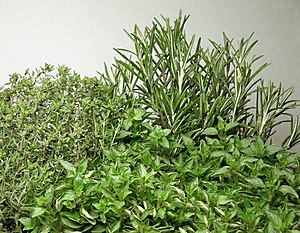Cookbook:Herbs and Spices
| Herbs and Spices | |
|---|---|
  | |
| Category | Basic foodstuffs |
Cookbook | Recipes | Ingredients | Basic foodstuffs
Spices and herbs are used in many different ways in the art of cooking. Different cultures use different sets of spices and herbs to give the dishes their distinguishing taste and flavour.
Characteristics[edit | edit source]
The difference between herbs and spices is that, if a leaf of a plant can be used to add flavor or aroma to dishes, then it is an herb. If it is another part, like the seed, fruit, berry, and bark, then it is a spice.
Whole vs ground[edit | edit source]
Most spices and herbs are available in either a finely ground form for cooking or in the raw form as a seed, nut, leaf, or tuber. Most of the time, the ground form is required to properly flavor the dish. Generally, whole spices keep their flavor longer than the ground spices. South Asian cuisines often use whole spices that they roast freshly before grinding for use, maximising the flavors and aromas released into the food.
Bay leaves are generally used in stews and soups and are almost always used whole.
Fresh vs dry[edit | edit source]
Often, a recipe will require modifications if the fresh version is used because the flavors do change in the drying process. Fresh herbs are nearly always better than dried herbs, as some subtle aromatics are lost during drying. When substituted in recipes, one part dried herbs are approximately equal to 3 parts fresh herbs. For example, 1/3 tablespoon of dried basil is equal to about one tablespoon of chopped fresh basil.
Blends[edit | edit source]
- Baharat
- Berbere
- Dry Rub
- Five Spice Powder (Chinese five spice)
- Herbes de Provence
- Garam masala
- Jamaican Jerk Spice
- Meat Masala
- Mexican Seasoning
- Milagai Podi
- Mixed Spice
- Panch Puran (Bengali five spice)
- Tandoori masala
- Za'atar
Index[edit | edit source]
For a list of herbs and spices, see Category:Herbs and spices or browse below: